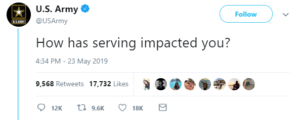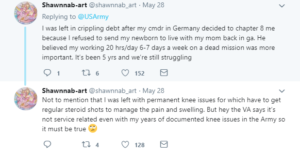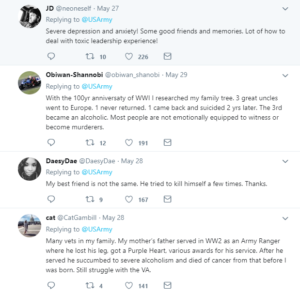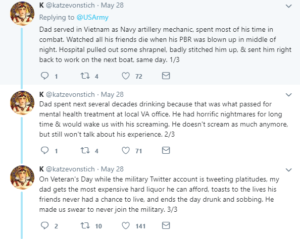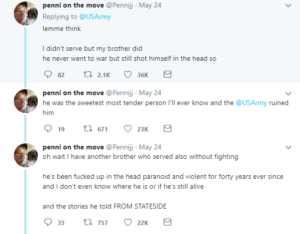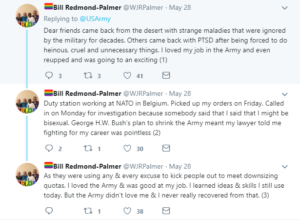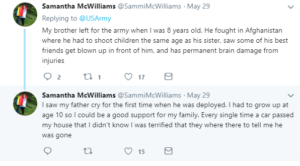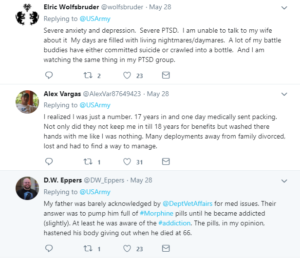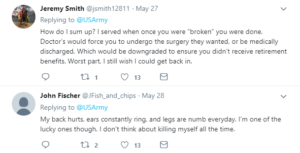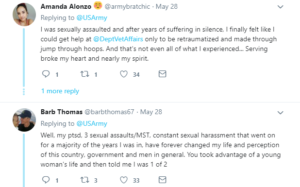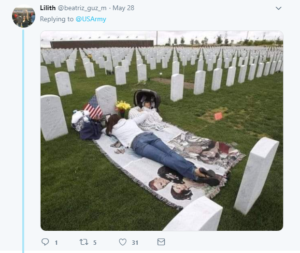Right before Memorial Day, the US Army’s official Twitter account asked the question “How has serving impacted you?” Swiftly and devastatingly, the answers poured in. While there were some positive stories, an overwhelming majority were lettered with fury, lamentations, regrets, pain, and mourning. These responses ring true to my experience as a therapist who has treated veterans for many years. As a current Army Behavioral Health Officer, I won’t comment on what I am seeing from servicemembers today. But as United States citizen, I was deeply disheartened by the sheer number of the tragic responses. I didn’t read all 12,000+ comments, but I probably got through 4,000 of them. I have selected about two dozen to give you a sense of it.
Yearly Archives: 2019
The Market is Flooded with MSWs
A former student of mine graduated with a BA in 2016 and then the MSW (Masters of Social Work) in 2017 from Rutgers. He got his LSW (his license to practice) shortly after graduation. For the last two years, he has worked a couple of different jobs, slowly developing both his macro (policy, writing, program design) and clinical skills. He recently decided that he would leave his job in search of a straight clinical position so that he could accumulate the 3000 hours he needs to earn his LCSW (licensed clinical social worker).
The LCSW is the top license a social worker can get. It allows a person to supervise other social workers (though one needs three years at that level, plus a certificate in clinical supervision in order to supervise LSWs). I know this is a lot to take in for non-social workers. You are welcome to continue reading, but this is a rare post that is directed at the social work population.
My former student is having a hard time finding a position (it is easier for males to find clinical social work jobs than females, as the field is largely made up of women and programs like to have at least one male therapist for diversity’s sake — this is a common theme in fields dominated by women…men continue to have a leg up). He was recently offered a job where he would work a mixture of hours 9-5 and 12-8. Ok. A few nights a week are to be expected, especially early on in a social worker’s career. He was told that he would have to work both weekend days. That’s brutal. Here is where it gets even worse – the days would be M, W, F, S, S. So the days off aren’t even bunched together. Then he found out that he couldn’t even get supervision from the supervisor in order to earn his LCSW, as the supervisor hasn’t had the license long enough. Horrific. One more thing – the pay wasn’t very good. He turned it down.
But the program had dozens of people applying. And here is why:
Over the last 10 to 12 years, many of the various schools of social work have rapidly expanded their programs (Rutgers either tripled or quadrupled the size of their student body). The University of Southern California created an online program several years ago and they’ve quickly become a national behemoth (I’ll write another time about the horror show that is online education, particularly for professions that rely on face-to-face contact). In their race to increase revenue by adding students, these schools have absolutely flooded the market with MSWs.
A flooded market means that there is a large labor pool. Too large. There aren’t enough jobs for all of the MSWs that are being produced. Schools will argue that there are jobs – but besides the aforementioned position, many of the jobs that people are offered out of school are either part time or per diem. Usually well beneath their skill set. Usually without much of a chance for clinical hours. Usually without a qualified supervisor.
The lack of jobs has led to a secondary problem. Because there is such a large pool of educated workers, it has led to wage suppression. And for people with student loans or housing costs (so basically, almost everyone), the money is untenable.I see this problem only getting worse.
The schools have done a huge disservice to their students. But wait, there is more. Because of grade inflation, many students are graduating with high GPAs thinking that it is the key to a good starting job. The schools are relying on either overworked adjuncts or researchers who don’t really understand the field to teach students and prepare them for their career. And still, there is more. For the last decade, a majority of my students (both undergraduate and graduate) report getting substandard or little to no supervision at their field placements (the internships tend to be 16 hours the first year and 22 hours a week the second year, usually of course, for no money). This is true for schools of social work around the country.
It’s a galling situation, and pretty depressing for any newly minted MSWs or current social work students. The schools aren’t going to pull back and give up all of that sweet tuition. I am hoping that I can convince some of the professional organizations to begin to address this problem (full disclosure, I’m on the Board of Directors for NASW-NJ, and to be very clear, my views are my own and not NASWs).
If you are a new MSW or are currently a student, there are a few actions you can take to make yourself more likely to survive in this awful labor market.
1) Pick a supervisor, not a job/internship. Find someone that loves teaching and mentoring and that will always find time for you each week to review your work, have you present cases, and continue to develop your skills.
2) Join your state NASW chapter and go to the monthly meetings in your county. Take service and leadership positions within your local and state units. Develop and expand your network (find as many ways as possible to do this).
3) Make a list of the skills that you have. Counseling skills include:
- Engaging
- Exploration
- Sustaining the Dialogue
- Refocusing
- Seeking Clarification
- Reflection
- Sharing Information
- Validation
- Appreciation
- Review/Summarizing
- Contracting
- Role-play
- Confrontation
Clinical skills include:
- Clinical Expertise (Anxiety, Substance Misuse, ADHD, PTSD, C-PTSD)
- Counseling Special Populations (spectrum, veterans, criminal justice, seniors, children)
Clinical modalities include:
- Individual (the most basic, and therefore, the easiest to find)
- Couples (for over a decade, I viewed this as Dante’s 9th level of counseling hell…now I do a lot of this with law enforcement, military and veterans)
- Group
- Family
- Multi-family (the rarest skill)
Other social work skills:
- Case Management (again, very basic and very replaceable)
- Assessments and Diagnosing
- Written reports
- Grant Writing (incredibly valuable)
- Article Writing
- Public Speaking (incredibly rare)
- Training
- Supervision (fairly rare)
- Public Policy Formation
- Program Evaluation
- Data Collection
- Teaching
- Coalition building
- Administration
- Billing
- Reviewing paperwork
- Outreach/Marketing
- Recruiting
- Program Design
Find an internship/job that will teach and develop some of these skills. They can only be taught by someone who can actually do them. When you apply, don’t talk about your degree or your GPA. Talk about the skills you have. And be specific about the ones you want to learn.
4) Do you have any other specialized skills? Are you good with Excel or SPSS? Can you write code? Do you have advanced computer skills? Can you speak a second or third language? If so, let your prospective employers know. Put it at the top of your resume. If you don’t have any of these, consider taking more classes (I know, I know) to make yourself a better candidate.
5) Accept that you will probably work some nights and weekends. Tell your family, friends and significant other that this is how the field works. If you are a clinical person, make a careful plan on how long your hours will take you and don’t deviate from your plan. Get your licenses as quickly as possible. If you are a management/policy social worker, you want to develop a number of those aforementioned skills. Remember that the more rare and stronger your skillset, the more likely you’ll get the kind of job you want. You’ll also get paid more.
6) This one will irritate many people: to really get ahead, you may want to consider working a full-time job and a part-time job. They should be very different. You’ll develop a better understanding of the field. You’ll learn new skills. You’ll expand your network much quicker. This comes with a sacrifice though, as time is a zero-sum game. You’ll need to have some serious (and difficult) conversations with people in your life. (To be very clear, I’m not advocating that you work 60+ hour weeks for 10 years. That is a relationship killer, and the best predictor of happiness is the amount of time spent with people that you care about. I’m suggesting that you work a nutty schedule for 2-5 years and then scale back.)
I wish it weren’t this way. Between the nature of late-stage American capitalism and the flooding of the market by the schools, students and recent graduates are in a terrible bind. This is the path forward.
On Suicide, Part Two
I’ve spent a lot of time over the last year reading books and articles on suicide. One book is Stay, which was written by Jennifer Hecht. She chronicles the history of suicide and the philosophical, religious, and civil arguments for and against it (post renaissance philosophers were the only ones that advocated for the right to kill oneself). I won’t rehash them here.
But I do want to summarize her two main arguments against suicide.
- “We owe it to society at large, and especially our personal communities, to stay alive.” (6)
The death of a friend or loved one causes great pain. There is the searing emotional agony, as well as growing recognition of permanent absence. Depending upon how present the departed was in another’s life, the more empty time is left. For many, it is a dreadful struggle back to a regular routine. That person’s pain and hardship is passed on to others, even those that didn’t know the deceased. The shockwaves ripple outward.
Ms. Hecht also wrote about the domino effect of suicides. “One of the best predictors of suicide is knowing a suicide.” (x) I would argue that there are proximity and mass domino effects as well: The closer that a completed suicide is to you, the more likely one is to attempt. And the more people you know that completed suicide, the more likely you are to attempt as well.
2. We owe it to our future selves.
Over a decade ago, I read Nick Hornby’s A Long Way Down. It is a novel about four people who meet at the top of a building in London on New Year’s Eve. They all planned to kill themselves, but didn’t because they were in the presence of others (suicide tends to be quite private). Mr. Hornby’s book (which has numerous comic moments) was well researched and took the subject very seriously. A key point was made, which is that most people that contemplate suicide move on if they survive the next 90 days. Many of us know cases where people considered suicide for years, even decades, but they tend to be outliers.
Since 2010, I have been telling friends with children that they should make deals with their kids. “I’ll buy this toy for you now, but you must promise to work five hours every Saturday in the garden at ages 14, 15, and 16” or some deal like that with their seven year old child (and get them to sign a paper and video record it). Kids have little to no sense of the time and long term consequences. Imagine how irritated your 14 year old would be when you produce the contract and the video.
“I can’t be held to what I wanted when I was 7!” they’d probably shout. The same probably goes for a deal made at 19 that is called in at 27, and so on and so on.
Back to suicide. I’ve worked with well over 100 people who were truly suicidal that did not kill themselves. Most of them are long past those thoughts and impulses, and have expressed gratitude that they did not go through with it. I have heard some version of the phrase, “I’m really glad that I didn’t kill myself. Things are so much better these days” then most will probably believe. But hopefully you will believe me.
____________
Ms. Hecht’s book concludes with this:
None of us can truly know what we mean to other people, and none of us can know what our future self will experience. History and philosophy ask us to remember these mysteries, to look around at friends, family, humanity, at the surprises that life brings — the endless possibilities that living offers — and to persevere. There is love and insight to live for, bright moments to cherish, and even the possibility of happiness, and the chance of helping someone else through his or her own troubles. Know that people, through history and today, understand how much courage it takes to stay. Bear witness to the night side of being human and the bravery it entails, and wait for the sun. If we meditate on the record of human wisdom we may find there reason enough to persist and find our way back to happiness. The first step is to consider the arguments and evidence and choose to stay. After that, anything may happen. First, choose to stay.
